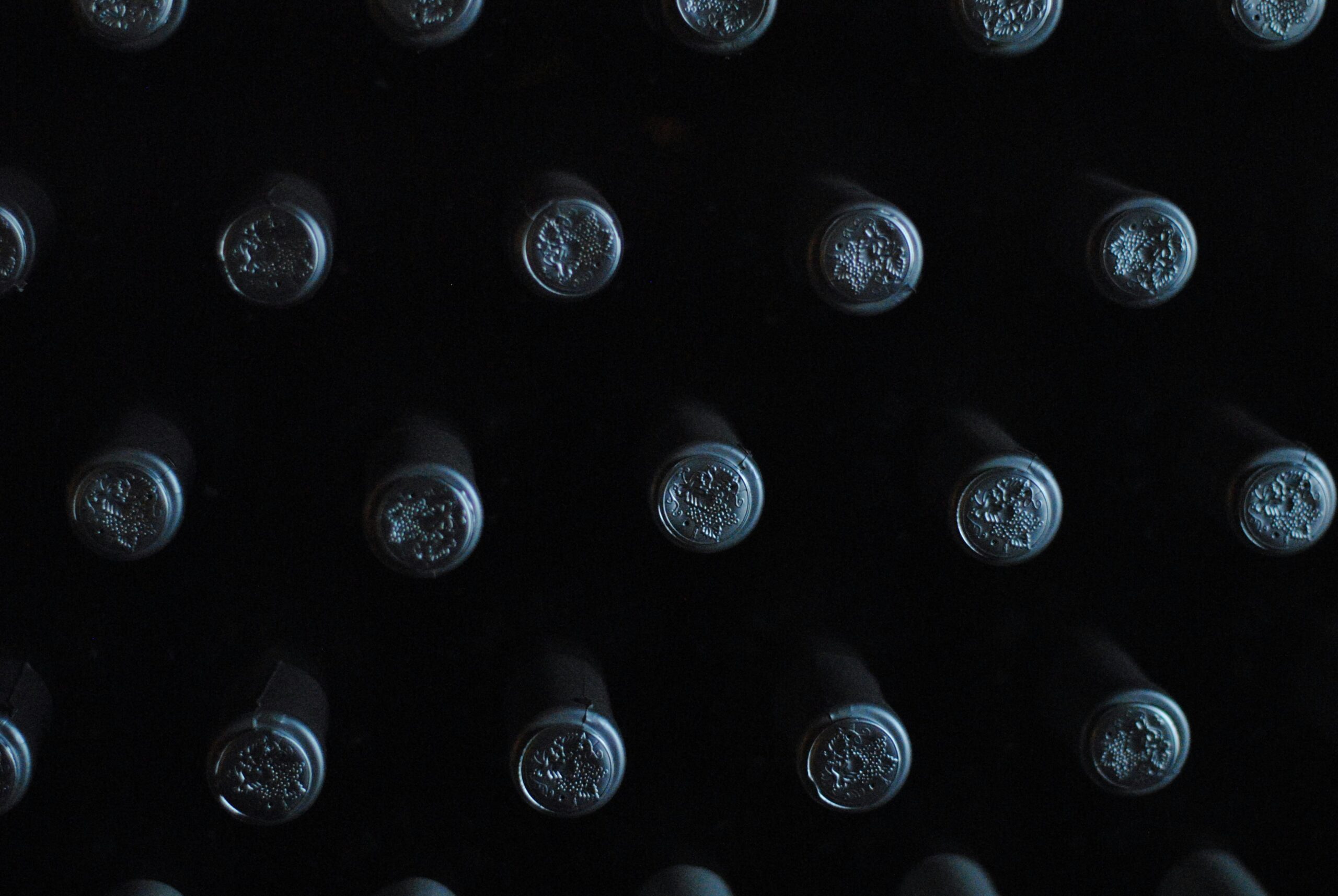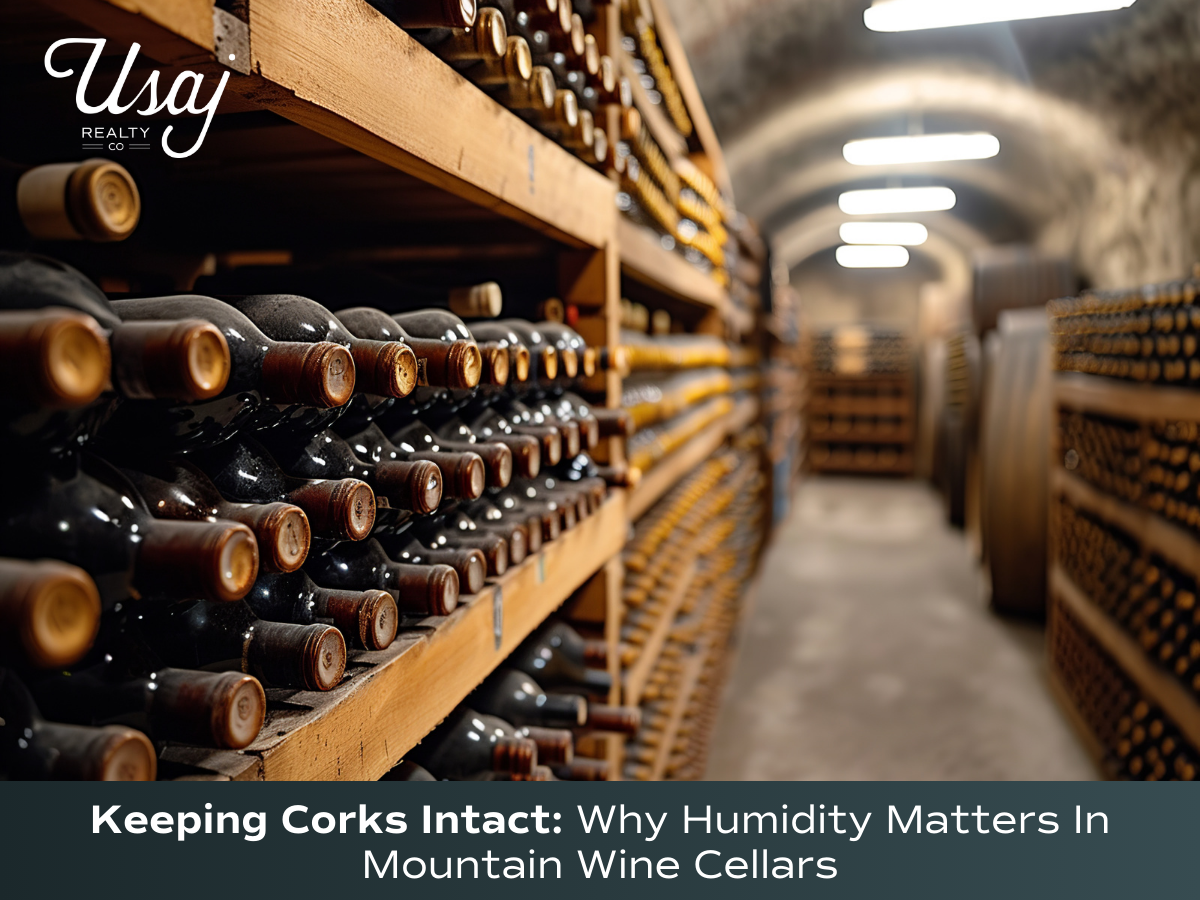“Preserving Perfection: The Crucial Role of Humidity in Mountain Wine Cellars”
Humidity in Wine Cellars plays a key role in preserving wine, particularly in mountain homes where the air is often drier due to higher elevations. Proper humidity levels, typically between 50% and 70%, ensure the corks remain moist, preventing oxidation and spoilage of the wine.
Low humidity can cause corks to dry out and shrink, allowing air to enter the bottle and compromise the wine’s flavor and aroma. On the other hand, excessive humidity can lead to mold growth, damaging both the corks and labels.

Photo by Biljana Martinić on Unsplash
Studies show that maintaining this optimal humidity range not only preserves wine quality but also extends its aging potential, ensuring a better-tasting product when it’s finally uncorked.
In mountain homes, where humidity fluctuations are common, investing in a humidifier or dehumidifier is necessary to protect your wine collection from these environmental risks.
The Importance Of Humidity In Mountain Wine Cellars: Focus On Drier Regions Like Colorado
Mountain homes, particularly in places like Colorado, face unique environmental challenges when it comes to wine storage. The drier air, coupled with fluctuations in temperature, makes controlling humidity a key aspect of preserving wine quality.
Humidity plays a critical role in ensuring that wine corks remain moist and intact, preventing oxidation, spoilage, and ultimately maintaining the integrity of the wine.
Challenges Of Wine Storage In Drier Mountain Regions
Mountain regions like Colorado are known for their arid climate and significant temperature changes, particularly at higher elevations. These factors can drastically affect the storage environment in wine cellars.
Without sufficient humidity, wine corks dry out and shrink, allowing oxygen to seep into the bottle. This oxidation process can spoil the wine, leading to off flavors and premature aging. Proper humidity management becomes even more vital in these areas to maintain the quality of your collection.
To address this, wine collectors in mountain regions must aim to maintain a consistent humidity level between 50% and 70%. Below 50%, corks dry out and risk crumbling, while humidity over 70% can promote mold growth and damage labels.






Impact On Cork Integrity And Wine Quality
The cork plays a pivotal role in protecting the wine from external air exposure. A dry cork leads to shrinking, which allows oxygen to enter the bottle, resulting in oxidation—a process that can ruin wine quality. In mountain areas where humidity tends to drop due to altitude, ensuring that the cork remains sufficiently hydrated is critical.
Maintaining an ideal humidity range ensures the cork stays moist and seals the bottle effectively. In a drier climate like Colorado’s, investing in a wine cellar with built-in humidity control systems or standalone humidifiers is paramount. For example, modern wine storage solutions often come equipped with hygrometers to monitor moisture levels, making it easier to maintain the ideal environment.
Best Practices For Humidity Control In Mountain Wine Cellars
Achieving the right balance of humidity can be tricky, especially in dry climates. Here are some best practices for controlling humidity in a mountain wine cellar:
- Invest In Humidity-Controlled Wine Fridges: In areas like Colorado, where both temperature and humidity fluctuate significantly, wine fridges with built-in humidity control can help maintain consistent levels. Look for units that offer sealed environments and dual-zone cooling, which allow you to store different types of wine at their ideal humidity and temperature.
- Use Hygrometers For Monitoring: Regular monitoring of humidity levels is vital. Installing hygrometers in your wine storage area will help ensure that humidity stays within the recommended range. Many wine fridges and cellars now come with built-in sensors that provide real-time readings, making it easier to keep conditions ideal.
- Use Humidifiers Or Dehumidifiers: Depending on the natural moisture levels in your cellar, you may need a humidifier to add moisture in drier seasons or a dehumidifier during more humid months. By adjusting these devices as needed, you can maintain the perfect environment for your wine.
Seasonal Adjustments In Mountain Wine Cellars
In mountainous areas like Colorado, the seasons bring significant changes in humidity levels. Winter months, for example, tend to be particularly dry, leading to a greater risk of corks drying out. During the summer, on the other hand, increased humidity can cause mold and condensation if left unchecked.
To combat these seasonal changes, it’s important to adjust your humidity controls as needed. For instance, running a humidifier more frequently in the winter can help counterbalance the dryness, while using a dehumidifier in summer will prevent excessive moisture buildup and keep mold at bay.
It’s also advisable to regularly check humidity levels during seasonal transitions and make adjustments before significant changes occur.
Long-Term Storage Solutions In Mountain Regions
For collectors storing wine over extended periods, proper humidity control becomes even more important. Over time, even minor deviations in moisture levels can lead to significant degradation of the wine. A well-maintained humidity-controlled environment will ensure that your wine matures as intended, developing the complex flavors and aromas that connoisseurs value.
To achieve long-term success, it’s vital to take preventative measures:
- Install Insulation And Vapor Barriers: Proper insulation in your wine cellar can help maintain stable humidity levels year-round. Vapor barriers can also help by preventing moisture loss in dry environments like the mountains
- Regular Maintenance: Maintaining your wine cellar or fridge with regular cleanings and inspections will help ensure that humidity stays in the optimal range. Pay attention to air filters, ventilation, and drainage systems to prevent mold and excess moisture from damaging your collection
For those in drier regions such as Colorado, controlling humidity in your wine cellar is important to preserve the quality and longevity of your wine. By investing in the right storage solutions, monitoring moisture levels, and making seasonal adjustments, you can ensure that your wine collection remains in perfect condition no matter the challenges posed by the local climate.
Wrapping Up
In addition to managing humidity levels, wine collectors in mountain regions should consider controlling light exposure and vibrations, as these factors can also negatively impact wine quality.
Installing UV-resistant glass or limiting direct sunlight can help protect the wine from premature aging. Moreover, minimizing vibrations in the wine cellar will prevent sediment disturbance, ensuring the wine ages gracefully.
By addressing these environmental factors alongside humidity, wine enthusiasts can create an optimal storage environment for their valuable collections.




